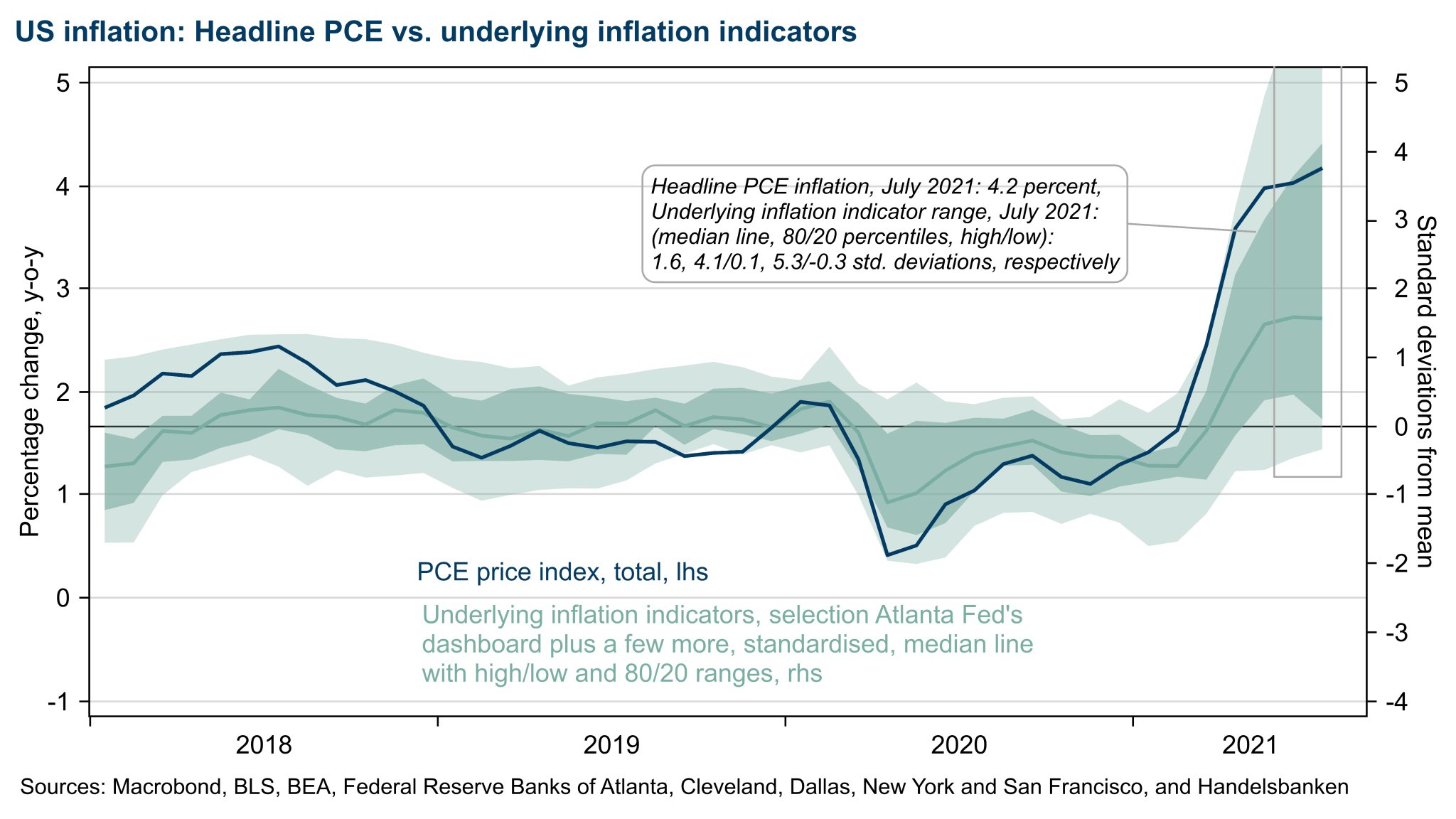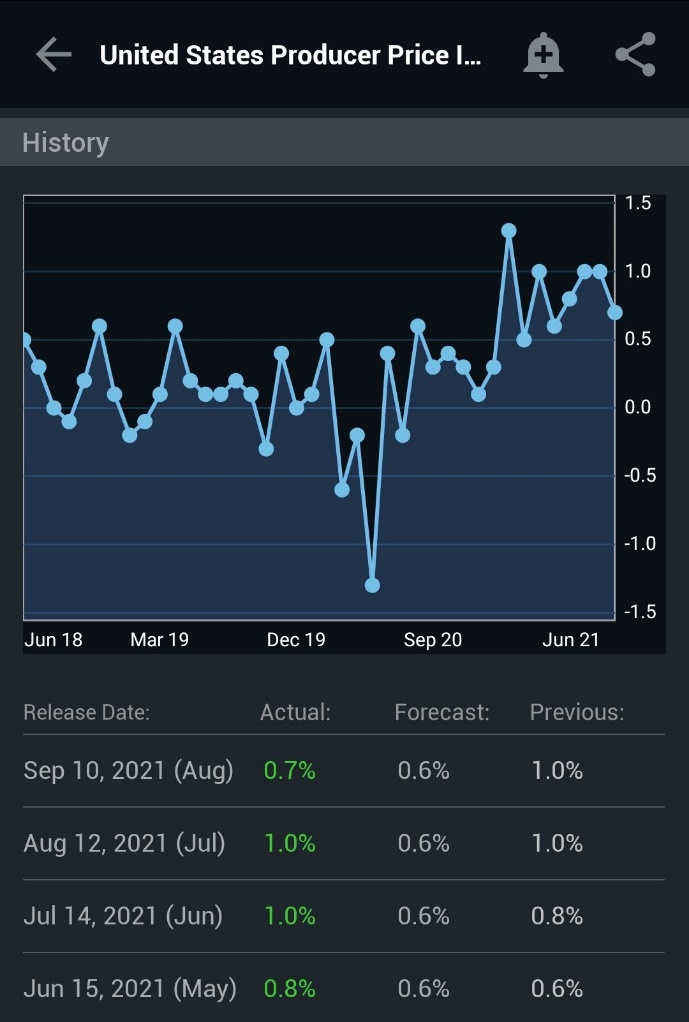Will China Tolerate Higher Inflation On Energy Prices?
Sunshine Profits | Sep 10, 2021 04:17PM ET
How does inflation impact energy markets? Is it of any importance to them?
If you have ever asked yourself these questions, here are my answers.
Inflation In Brief

Consumer Price Index (CPI), Producer Price Index (PPI), etc.
To measure U.S. inflation rates, we currently use the Consumer Price Index, which tracks a basket of consumer goods and services that involves food and energy prices.
Is underlying inflation really high or has it peaked? Well, it’s difficult to say, as some indicators may contradict each other on that matter.

Tuesday’s CPI report showed the traditional core Consumer Price Index staying at an elevated level of +4.3% year-on-year, according to the Bloomberg survey.
In the case of China’s consumer inflation, it remained generally stable in August, while factory-gate prices registered expansion largely due to the increasing commodity prices: the Chinese CPI rose 0.8% year-on-year in August, a bit lower than 1% in July. The Producer Price Index (PPI) went up 9.5% over the same period in August, so a little faster than 9% in July.

On the U.S. side, the PPI rose +8.3% year-on-year in August (versus estimates at +8.2%), while the Core PPI progressed +6.7% over the same period. It’s higher than the expected +6.6%, but it rose at a slower pace compared with the last month’s increase. Actually, this slowdown in progression might be seen as inflationary pressures being moderated at the moment.

What Impact Does It Have From the Energy Perspective?
Yesterday, we saw that oil prices had fallen due to the announcement that China was using its strategic oil reserves. The Chinese announcement mentioned that millions of barrels were put up for sale in July, according to Bloomberg, which quoted an anonymous government source. In fact, China, as the leading importer of crude, seeks to fight against rising energy prices, signalling that the economic giant will not tolerate too high inflation. However, oil prices rebounded quickly into the same support zone ($67.53-67.94) that we had projected (Fig.1) with the prospect of dwindling reserves in the U.S., which is the world's largest consumer.
Moreover, even if we know that China has decided to sell a part of its strategic reserves to limit the pressure of rising raw material prices on industrial production, there is still no information on the amount of oil that is going to be put on the market.
Figure 1 – WTI Crude Oil (CLV21) Futures (October contract, daily)
Today, oil prices rose again – back to yesterday morning’s levels – and the market is turning more optimistic on China-U.S. relations after a phone call between U.S. President Joe Biden and his Chinese counterpart, Xi Jinping. Indeed, that phone call had the same effect on the oil market as it had on other assets because any signal that Sino-U.S. relations are improving is seen as positive for global trade and, therefore, for global financial markets.
On the geopolitical scene, we also noticed that Libya aspires to produce 2 million barrels of oil per day from 2022, which may indeed sustain the supply.
In summary, we can highlight that China has limited tolerance for the impact of higher inflation on the energy prices – and this is perfectly understandable from the perspective of the leading importer of crude oil. Inflation is certainly an important indicator to keep an eye on in the forthcoming weeks, particularly for anyone interested in energy prices.
Trading in financial instruments and/or cryptocurrencies involves high risks including the risk of losing some, or all, of your investment amount, and may not be suitable for all investors. Prices of cryptocurrencies are extremely volatile and may be affected by external factors such as financial, regulatory or political events. Trading on margin increases the financial risks.
Before deciding to trade in financial instrument or cryptocurrencies you should be fully informed of the risks and costs associated with trading the financial markets, carefully consider your investment objectives, level of experience, and risk appetite, and seek professional advice where needed.
Fusion Media would like to remind you that the data contained in this website is not necessarily real-time nor accurate. The data and prices on the website are not necessarily provided by any market or exchange, but may be provided by market makers, and so prices may not be accurate and may differ from the actual price at any given market, meaning prices are indicative and not appropriate for trading purposes. Fusion Media and any provider of the data contained in this website will not accept liability for any loss or damage as a result of your trading, or your reliance on the information contained within this website.
It is prohibited to use, store, reproduce, display, modify, transmit or distribute the data contained in this website without the explicit prior written permission of Fusion Media and/or the data provider. All intellectual property rights are reserved by the providers and/or the exchange providing the data contained in this website.
Fusion Media may be compensated by the advertisers that appear on the website, based on your interaction with the advertisements or advertisers.